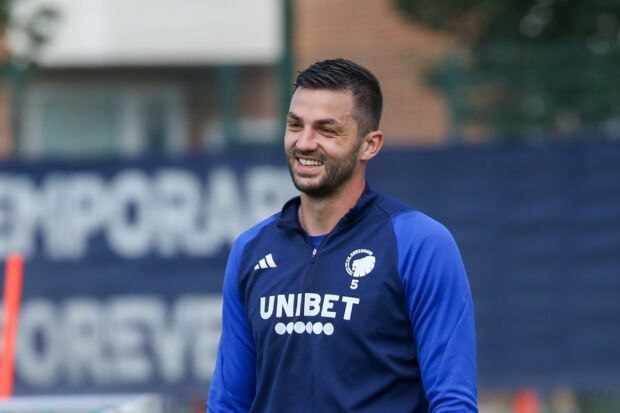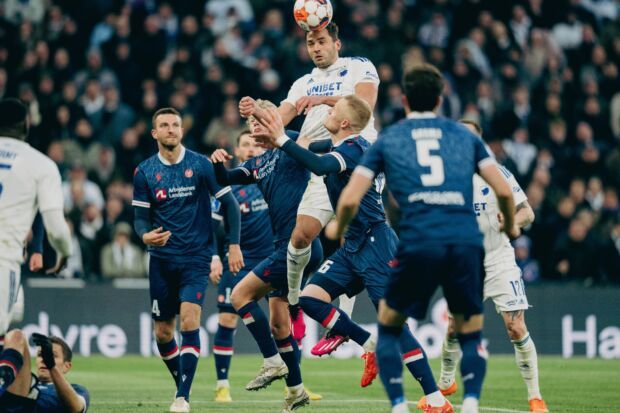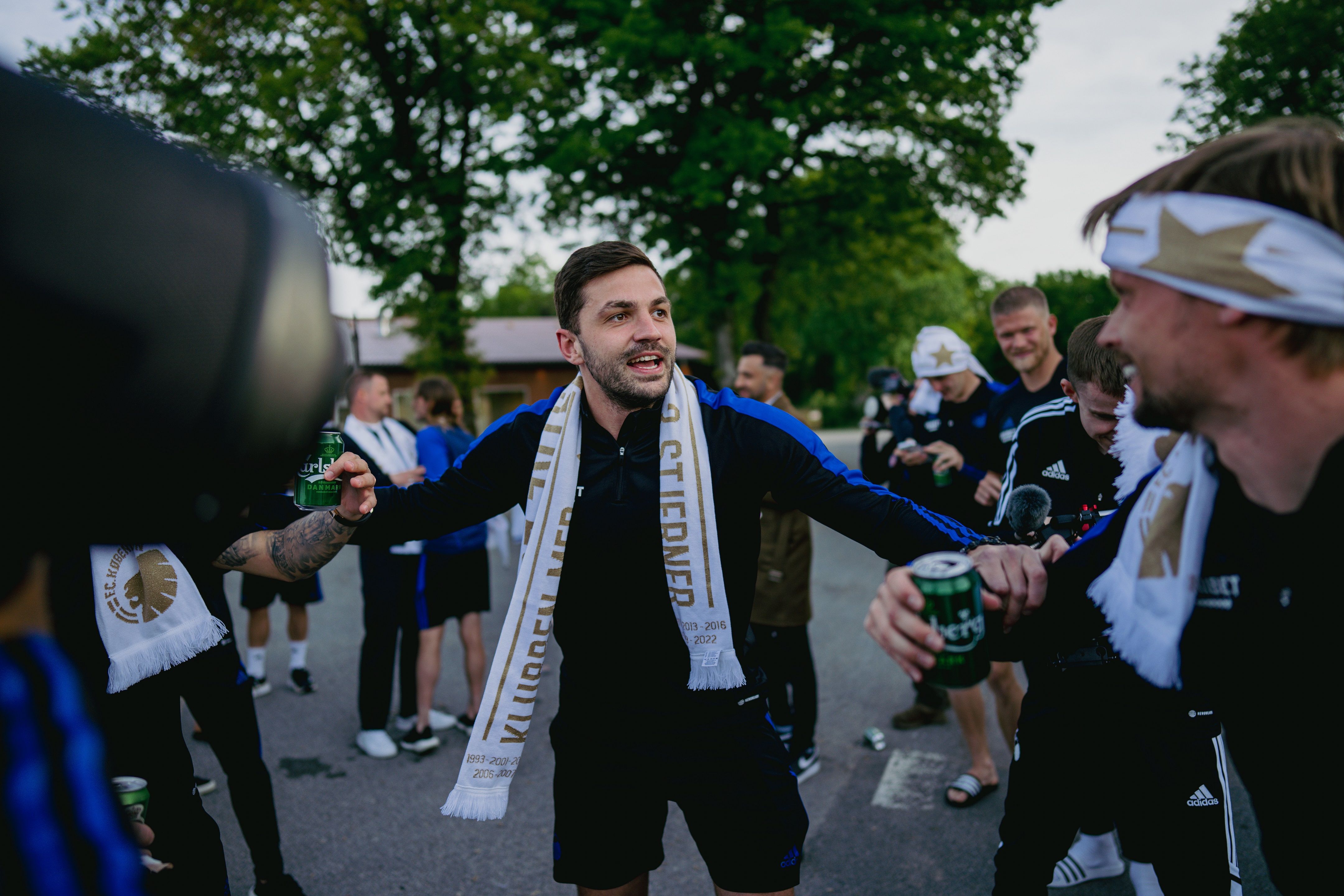FC Copenhagen’s centre-back has had little time to rest in the two years since he transferred to the league-topping team.
League-topping now, that is; when FCK signed Georgian-born Davit Khocholava in 2021, they were number three, and he was playing at the top of the Ukrainian Premier League.
“It was extra motivation to come and try to win the league in the first year,” he says, speaking with the kind of matter-of-factness typical of athletes used to topping tables.
Khocholava was The Lions’ fourth-highest transfer sum of that year, and his play was a shot-in-the-arm for the team: they promptly won two consecutive Danish Superliga, and qualified for the 2022/23 UEFA Champions League.
But off the pitch, Khocholava was just as busy. Six months after his relocation from Kyiv to Copenhagen, Russia invaded Ukraine. Suddenly, he was tasked with evacuating his extended family from a war zone, while the Champions League qualifier hung in the balance.
“It was quite chaotic,” he remembers.
At age 30, he has the composure of one who has handled uncommon adversity in the public eye, but the quick, boyish smile and hungry ambition of a sportsman in his prime.
Or, not quite in his prime: Khocholava has been off the pitch for six months with two serious knee surgeries.
“It’s tough times. It takes so long to recover,” he laments, casting his eyes out of the panoramic window to the empty green of FCK’s training ground, affectionately known as 10’eren, below the meeting locale in which we’re sitting.
“I’m close. I had my first pitch session today. Hopefully in the last week of August, I’ll be with the team.”
But the rest looks good on him. It’s given him time to recalibrate and reflect on raising a family in the Danish capital; on cultural differences between west and east; on fighting for his sporting career while his country fights for freedom.
Today, before he straps his boots on for the next season, he tells The Copenhagen Post what he makes of it all.

From Georgia, to Ukraine, to Copenhagen
“I had wanted to come to Copenhagen for a long time. I got the chance in 2019 when I first began negotiations with FCK. My initial impression of Copenhagen was ‘this is a beautiful place with nice people’ – which really strengthened my desire to be here.”
Then 26, Khocholava was living in Ukraine:
“I’m born in Georgia, but my father is half-Ukrainian and Ukraine is my second homeland. I was playing for Shakhtar Donetsk while Donetsk was occupied by Russia, so we had to live in Kyiv and play our home games in a rented stadium in Kharkiv, 600 kilometres away. For four years, I was taking six to eight flights a week,” he recalls grimly.
Though he speaks of life in Kyiv with pride, it’s not hard to imagine the comparative allure of Copenhagen, where the FCK training ground and home stadium are a mere 6 kilometres apart.
“Plus, I knew I would be playing for the biggest club in Scandinavia,” he adds.
Happy, affluent… and lazy?
But transport logistics and prestige aside, Khocholava was drawn to the promise of broader lifestyle changes. He points to the two most oft-quoted stereotypes of Danish life.
Firstly, Denmark is one of the happiest countries in the world:
“Generally, people here have a good financial situation,” he says.
“They are sure of how it will play out when they get old and take their pension. They are happy, they are calm, they don’t flaunt their money. In Georgia and Ukraine, people are more likely to show off their wealth.”
Secondly, the Danish work-life balance is healthy:
“To be honest, the first six months I was here I thought Danes were lazy!” he laughs.
“But then I understood that they don’t have the same societal problems that people in other countries do. Life is slower because they are enjoying it. They will not work their asses off for a bonus – they would rather have time with their family, or meet friends for dinner after work, than stay longer in the office.”
A new start, shattered by war
By this point, it was the beginning of 2022. Khocholava had waited two years for a suitable transfer window to facilitate his move from Shakhtar Donestsk to FCK, had executed what he calls ‘the smoothest relocation I’ve ever done’, and was comfortably settled in Denmark.
I ask him what happened next. His speech quickens, becomes terse:
“We knew about the invasion a month or two before it started. My father-in-law, an ex-army soldier, had information that the Russians were preparing their troops and tanks.”
“I asked my father and my father-in-law to leave Ukraine and, if everything went well, they could come back. But my father-in-law said ‘if not us, who will defend the country?’ He decided to stay. He was killed by Russian terrorists.”
Though his voice cracks, Khocholava’s eyes are steady as he recounts the aftermath.
“The day after, I flew to Slovakia to bring the rest of the family – my mother-in-law and sisters – to our home in Denmark. We didn’t know what else to do. I just thought, ‘I need to get them out as soon as possible.’”
What did he think of the Danish media response to the invasion. Was it enough? He doesn’t reply immediately, but his eyes give it away.
“I’m always going to say that it wasn’t enough, like any other Ukrainian,” he says, after a pause.
“Even though they are grateful for Denmark’s weapons donations, it’s never enough when it’s about life and death. So, yes and no.”

Unity through adversity
Despite the immense weight of the tragedy, he had little choice but to bear it in public. But where the media coverage fell short, the solidarity shown by friends and strangers blew him away.
On the same day that FCK announced the news to its supporters, the team played a home game against Randers FC. In the final minutes, a visibly emotional Khocholava was brought on to a storm of applause.
“The support that me and my family got from the club, from the board, from random people, from Section 12 in the stands where our most hardcore fans are – it was just insane,” he says.
“I won’t mention names, but someone offered their summer house to my family. I got 30 or 40 boxes of clothing. There were so many messages and donations of food or supplies from friends and strangers.”
“I’m a family guy”
The outpouring galvanised Khocholava’s sense of Ukrainian identity, but also that of belonging in Copenhagen. And despite the unthinkable burden he has shouldered since moving here, he summarises his family’s settlement as “perfect”.
“My wife loves it here. She works in interior design and really admires the Danish style,” he enthuses.
“It’s actually really cool because over the last three months or so, I’ve started to find it interesting, too.”
A self-professed ‘family guy’, he brims with warmth when the conversation turns to his time off:
“I like going to the cinema with my wife or for a walk with my son – even though it’s more exhausting than playing two matches! He’s at the age where he runs everywhere and doesn’t stop.”
And then:
“I love taking him to the Experimentarium in Hellerup. It’s a museum for kids where they learn things like how DHL delivers post to different countries. Honestly, I have more fun than him!”
Off the field, but not in spirit
Most of all, what comes across when speaking to Khocholava is how loyal and genuinely likeable he is.
Whether he’s describing his career aspirations – “reaching Champions League play-offs with FCK and taking the Georgian national team to the World Cup” – his pride for the Ukrainian people, or his wife’s profession, his heart is always on his sleeve.
That’s how he keeps his focus, keeps winning, and keeps smiling: by giving himself fully to the things he’s dedicated to.
Case in point: in May this year, despite his six-month absence from the pitch, he scored serious brownie points with fans and teammates alike when he joined the ranks of Section 12 to cheer The Lions from the home-ground stands during their 4-3 victory over Aarhus’ AGF.
“That doesn’t surprise me!” laughed FCK midfielder Rasmus Falk when he heard about it.
“I bet he’ll still be there in ten years’ time.”
Quick-fire favourites with Davit Khocholava
Place to hang out?
Home, because of my wife and kid.
Restaurant?
MASH. It has the best meat.
Bar?
Brønnum. I like the atmosphere.
Nightclub?
I haven’t been to a single nightclub in Denmark, but let’s say Museo because I was there for a private celebration of the Championship.
Music Festival?
Roskilde. I think the bands are good.
Beach?
Anywhere up in Hellerup.
When I was living in Østerbro, we used to go to Svanemølle, but there’s too much seaweed on the beach there. I hate the smell.
Park?
Fælledparken. Firstly, because of Parken and second, the park is huge and has everything.
You want to bike? You have bike trails.
You want to run? You have football pitches.
You want to see the best stadium in Scandinavia? You have Parken.
You want to buy something? You have FCK souvenirs with my face on!













